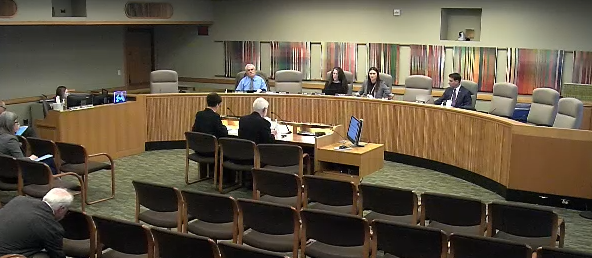 |
| After almost 3 years The ARCHES Project will soon be restoring hygiene and meal services |
Since the day shelter opened in July 2018 -- sans hygiene and kitchen facilities -- it's had more than 800 unique visitors. According to a February report, most visitors were homeless (82%) white (81%) men (61%). They came to check their mail and messages, and perhaps pick up a sack lunch or some pet food or a haircut voucher. If it was a mobile shower day, they might have had a shower. Most stayed an hour or two only.
Maximum day shelter occupancy during this time has been roughly equal to the average number of visits per day (around 100), but actual capacity was half that, partly due to visitors resting on the floor and partly due to high stress levels. The renovations are expected to increase maximum occupancy by about 10%.
In other MWVCAA news, Jon Weiner replaced Jennifer Wheeler as chair of the Board of Directors, the agency is considering hiring a Deputy Director, a position that's been vacant since Cyndi Leinassar jumped ship (see "News from the Continuum") in 2018, and the second and final balloon payment ($225K) on 615 Commercial Street NE has been made. Hopefully, this means there will be more homeless assistance dollars going toward homeless housing. See "MWVCAA Pays Mortgage Debt with Hless Assist $$." (21 February 2019.)
Finally, MWVCAA seems to have pulled its financial act together. See, e.g., "ODE to MWVCAA: "Seriously Deficient." (12 September 2018.) Executive Director Jimmy Jones, who took over from Jon Reeves in 2018, recently reported to his board:
Over the past year we have stabilized and rebuilt the agency’s cash and credit position. We have also made considerable progress on internal controls, our policies and procedures, and our consistency in meeting the agency’s broader general responsibilities. We still have a long way to go on some fronts. The auditors are here this week for the annual single audit, and I spoke in depth with the senior partner of our auditing firm. It usually takes agencies in our position three-to-four years to dig out of the kinds of holes that we found ourselves in during the spring of 2018. We’ve made good progress on some fronts. This audit is unlikely to find any material weaknesses for the second audit in a row, which will get us out of “high risk,” where we’ve been parked for three years now, and return us to “low risk” status.
The agency's corrective actions in this area were much needed and long overdue. There's never been so much money pouring into MWVCAA for housing programs (all run by The ARCHES Project), and it's important that it be spent on housing people, not managing homelessness for the sake of downtown businesses or buying old office buildings that take years and cost millions to renovate.
 |
| 2019-2021 Housing Programs by Funding Source |
The Housing and Community Services Department will report to the legislature by June of 2020 on options to implement a statewide homeless management information system (HMIS) that enables clear outcome tracking for homeless individuals. The report will focus on a system implementation that meets federal and state requirements, improves data driven decision making, and aligns with national best practice. Specific items to address include a recommendation on the capabilities of an optimal system, system governance, models from other states that enable data driven decisions, the organization that is best positioned to administer the system, and an assessment of administrative workload options to fund administration.
By adopting this note, the legislature and governor basically told OHCS the reports coming out of the state's Community Action Agencies have been crap. Rightly or wrongly, they all blame the state's HMIS. A February 7, 2020 memo from OHCS to the Housing Stability Council describes OHCS's response to the budget note. *Spoiler Alert* The situation is hopelessly complicated by politics and bureaucracy and the coded language of the memo will not inspire confidence. Enter the Secretary of State:
 |
| Oregon Secretary of State plans to audit statewide homeless services |
 |
| Speaker Kotek and Mayor Bennett at Senate Committee on Housing & Development, 3/3/20 |
Plan B? Hope the winter of 2020/2021 is another mild one.
Speaking to the Salem City Council on March 9, Mayor Bennett said "when" the Governor reconvened a special session he hoped Speaker Kotek's "homeless package" (including HB 4001) was at the "top of the agenda." But Governor Brown had said three days earlier that she was reluctant convene a special session unless legislative leaders come up with a “functioning” plan. Withycombe, C. "End of legislative session leaves pile of dead bills in its wake." (9 March 2020, Salem Reporter.)
Returning to the subject of crap data, providers in Marion and Polk counties conducted another seven-day unsheltered Point-in-Time Homeless Count for 2020. The first seven-day count was in 2019. MWVCAA reports that 1,099 households were surveyed this year, mostly in Salem. It had been hoped that this year's count would jive more closely with local HMIS data that indicate the area has about 1,800 unsheltered individuals. "Recent camp sweeps, the camping ban in Salem and the outflow of a percentage of Salem’s homeless deeper into the woods made the count this year exceptionally difficult", a February report states. The official numbers will be released later this year.
 |
| Rough 2020 Marion and Polk Counties' Unsheltered PIT Count Result: 1,099 Households Surveyed, courtesy MWVCAA |
No comments:
Post a Comment